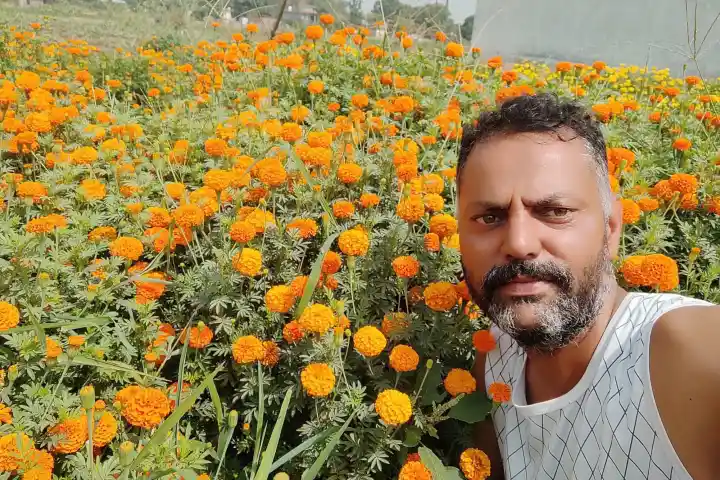

A farmer in Himachal Pradesh shows his marigold crop (Photo: @Bhavya100/Twitter)
A new marigold revolution has started to sweep across the barren hills in Himachal Pradesh’s backward Chamba district bringing in prosperity for local farmers from the sale of aromatic oil extracted from the yellow flower known for its fragrance.
Meet Pawan Kumar, 47, a small farmer at Talla village, who is at the centre of the revolution. Pawan Kumar alone has 30 bighas of wild marigold cultivation producing 220 quintals of the crop and has linked nearly 400 farmers in Shiyunta mountain belt with the yellow flowers.
Last year, Pawan Kumar extracted around 90 kilos of oil from the produce and the entire stock got sold-out to two leading buyers at Gujarat and Delhi through an e-market linkage .
“ I can’t tell you the exact returns from the crop, but I have paid Rs 10 lakh as GST for my two transactions to supply aromatic oil in 2021. By next year, the amount could see a substantial increase as I have taken land on lease from a few fellow farmers for wild marigold cultivation. This is a waste land as farmers had abandoned it due to the monkey menace” he told the India Narrative
Today, Pawan has become a role model for most farmers in the district. The income, he says, is almost five times as compared to what he used to earn from cultivation of maize or other traditional crops.
The climatic conditions in Chamba are best suited to the cultivation of marigold. The oil is sold on demand at Rs 9,000 to 10,000 per litre because of its high quality .
The aromatic plants are hardy, less prone to animal attacks and, most importantly, have a huge demand in the perfume, flavouring and condiment industries.
There is no irrigation facility in the Chamba area. Wild animals like monkeys, langoors and wild boars that damage crops have forced the farmers to give up cultivation, as it has turned unviable. The agriculture operation also used to be limited to three or four months. This was the basic reason for poverty and economic deprivation. Many families have moved out to towns for livelihoods.
“The credit for the marigold revolution goes to Palampur based CSIR- Institute of Himalayan Bioresource Technology (IHBT), which provided seeds free of cost to the farmers and imparted training as well . IHBT also sanctioned distillation plants for oil extraction and thereafter provided linkages to the market” Pawan Kumar explained.
The best thing about wild marigold is that monkeys, wild animals and stray cattle don’t damage the crop.
Dr Sanjay Kumar, Director CSIR-IHBT, said, “Initially the farmers were quite reluctant but after IHBT scientists did some workshops, imparted training, gave them high quality seeds, set-up processing units and took care of market linkages things worked well.”
IHBT has been able to set-up 57 distillation units of which 14 are in Himachal Pradesh, primarily in Chamba district. During five years the farmers have earned Rs 22 crore alone from wild marigold cultivation as more than 400 farmers have adopted the crop. Total returns from all essential oils from lemon grass, Damask rose and few other Himalayan aromatic crops was around Rs 32 crores .
Under the aroma mission of the central government more than 14 states have been selected for promoting the cultivation of marigold and other crops. The states like Uttarakhand, Odisha, Gujarat, Tamil Nadu, Madhya Pradesh, Chhattisgarh, Jammu and Kashmir, Sikkim, Manipur and Maharashtra are producing some of finest natural oil extracted from the flower. This has a high export value and a huge demand in the domestic market, he says.
The extracts from the flowers are used to make essential oils used extensively in making perfumes.
The farmers are even set to meet the growing demand for essential oils from countries like France, Brazil, Kenya and Australia. The product has high demand, guaranteed buyers and fetches lucrative prices.
Rumla Devi, a local panchayat Pradhan recalls that even during the Covid time, the farmers managed to continue cultivation and oil extraction. IHBT met the demand for seeds and helped in the marketing of the oils .
The prices of oil varied from Rs 7,000 to Rs 10,000 kg. Those farmers who used to earn Rs 1000 per bigha from their traditional crops were happy with returns increasing to 10,000 to 15,000 per bigha. Few had incomes ranging between Rs 1.2 to 1.5 lakhs per hectare by growing this crop and producing essential oil within a period of 5-6 months.
The domestic industry imports marigold from Australia, France, Brazil and Kenya. The global essential oil market demand is projected to expand at a compounded annual growth rate of 8.6 per cent from 2020 to 2025.
Says Rakesh Kumar, a principal scientist at IHBT, “ In the beginning we tied up a buy back arrangement with private companies but now the farmers are getting direct supply orders from the companies.
Also Read: Climate change emerges as big threat to apple orchards in Himachal Pradesh
India's largest automobile in-plant railway siding at Maruti Suzuki's Manesar facility started operation on Tuesday,…
Google on Tuesday unveiled its Safety Charter for India's AI-led transformation, at the "Safer with…
The human rights organisation of the Baloch National Movement (BNM), Paank, has published its most…
The Israel Defence Forces (IDF) on Tuesday claimed that it has killed Iran's senior-most military…
Amid escalating conflict between Iran and Israel, the Ministry of External Affairs (MEA) on Tuesday…
Amid the escalating tensions between Israel and Iran, Indian Embassy in Iran has asked all…